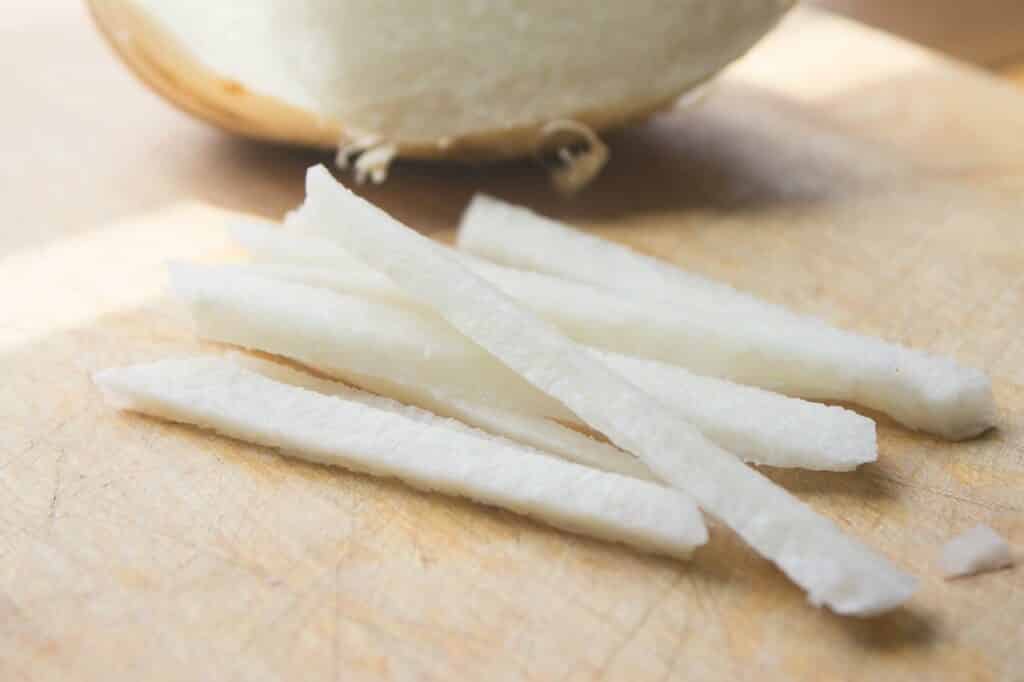Jicama is a nutritious vegetable for humans full of probiotics.
As a loving dog owner, you may want to share with your furry friend the benefits of jicama.
However, seeing your pup sick due to food poisoning keeps you wondering whether dogs can eat jicama.
So, can dogs eat jicama?
Yes, dogs can safely eat jicama because it’s a nutritious vegetable with dietary fiber and calcium.
However, dogs should not eat the leaves and stem of jicama as they contain the rotenone toxin, which can cause gastrointestinal upset.
Feeding your pup a nutritious diet in the right way and amount is essential for his well-being.
This article discusses the benefits, risks, and safe practices for feeding your dog jicama.

Benefits of Jicama to Dogs
Jicama is a superfood because it contains the following nutrients:
- Vitamin C
- Folate
- Potassium
- Vitamin E
- Calcium
- Iron
- Beta-carotene
- Water
- Antioxidants
- Magnesium
- Dietary fiber
Giving your dog jicama benefits him in the following ways:
Developing Strong Bones and Teeth
Dogs need strong bones to support their weight and teeth to chew food comfortably.
Calcium is an essential nutrient for forming strong bones and teeth in dogs.
It also prevents osteoporosis in puppies.
Your dog needs 1.25 mg of calcium per calorie for healthy growth.
Apart from aiding in the formation of strong bones and teeth, such an amount of calcium promotes muscle contraction.
This is essential for hunting and dogs that exercise a lot.
A diet rich in calcium helps puppies grow into healthy adults with strong bones and teeth.
Thus, adding jicama to your pup’s diet is an excellent way to help him meet his daily calcium requirements.
Aiding in Digestion
Jicama is a good source of dietary fiber, which is beneficial for dogs suffering from constipation or diarrhea.
The insoluble fibers present in jicama absorb water and add bulk to stools.
This makes stools softer and easier to pass.
The soluble fibers in jicama help regulate the movement of food through the digestive tract.
They also bind with water to form a gel-like substance that lubricates stools and makes them easy to pass.
This prevents constipation and diarrhea by regulating bowel movements.
Constipation and diarrhea are dangerous to dogs as they may lead to:
- Dehydration
- Intestinal blockages
- Electrolyte imbalances
- In severe cases, death
Reducing the Risk of Cancer
According to the Whole Dog Journal, cancer is a leading cause of death in dogs.
Jicama contains antioxidants that scavenge harmful toxins and free radicals in the body.
These toxins and free radicals are responsible for damaging cells and DNA, which may lead to cancer.
The antioxidants in jicama help protect cells and DNA from damage caused by toxins and free radicals.
In turn, this reduces the risk of cancer in dogs.
Jicama also contains beta-carotene, which is converted to vitamin A in the body.
Vitamin A is an essential nutrient needed for the growth and repair of tissues.
It also boosts the immune system and helps protect the body from infections.
A Healthier Digestive System
Jicama contains prebiotics, a dietary fiber that helps maintain a healthy digestive system.
Prebiotics feed the good bacteria in the gut and promote their growth.
A healthy digestive system is essential for dogs as it helps them absorb nutrients from food and eliminates toxins from the body.
Prebiotics in jicama help maintain a healthy digestive system by promoting the growth of good bacteria in your dog’s gut.

Risks of Jicama to Dogs
Dogs should only eat the fleshy part of the jicama root.
The leaves and stems contain rotenone, a toxic component for dogs.
This compound is a natural insecticide that is harmful to dogs and humans.
If your dog ingests the leaves or stems of jicama, he may experience the following symptoms:
- Gastrointestinal upset
- Vomiting
- Diarrhea
- Lethargy
- Muscle weakness
- Difficulty breathing
Mature jicama seeds also pose a choking risk to dogs.
Safe Practices for Feeding Jicama to Dogs
Jicama is a nutritious and safe dog treat when fed the right way.
The following practices will help you feed your furry friend jicama the right way:
- Feed only the fleshy part of the root to your dog. Avoid feeding him the leaves, stems, or seeds as they may be harmful.
- Cut the jicama into small pieces to avoid the risk of choking.
- Monitor your dog closely when he’s eating jicama for the first time. Stop feeding him immediately if he reacts by vomiting or diarrhea, and consult your veterinarian.
- If you’re feeding a puppy, puree the jicama and mix it with his usual food. This will make it easy for the puppy to get used to jicama.
How Much Jicama Should Dogs Eat?
An adult dog can eat 1/4 cup serving of jicama per day.
If you’re feeding a puppy, start with a small amount and increase it gradually as he gets used to the new food.
When adding jicama to your pup’s diet, do so gradually to avoid gastrointestinal upset.
Start with a small amount and increase it slowly over time.
This will give his digestive system time to adjust to the new food.
It’s worth noting that excessive jicama can cause gastrointestinal upset due to the high fiber content.
Only give your pup the recommended amount to supplement his usual diet.
You can also consult your vet on how much jicama to feed your furry friend for optimal health.
Frequently Asked Questions
Is jicama poisonous for dogs?
No, the fleshy root of jicama is not poisonous for dogs.
Only the leaves and stems are toxic for dogs.
Can dogs eat jicama every day?
Yes, it’s safe for dogs to eat jicama every day.
However, they should not overeat it as this can cause gastrointestinal upset.
Can dogs eat raw jicama?
Yes, raw jicama is safe for dogs.
However, puppies should not eat raw jicama as their teeth are still weak.
Final Thoughts
Jicama is a safe and nutritious vegetable for dogs.
However, when feeding dogs this vegetable, care must be taken by avoiding the leaves and stems.
These parts contain the toxic rotenone that can cause vomiting, diarrhea, and breathing difficulties.
It’s advisable to give your furry friend jicama in moderation.
Excessive jicama can lead to gastrointestinal issues like vomiting and diarrhea due to high fiber intake.
- What Dog Breeds Have Pink Skin? - March 24, 2023
- What Are the Most Inspiring Dog Breeding Quotes? - March 20, 2023
- Can Pheromone Spray Help Improve Dog Breeding Results? - March 19, 2023








